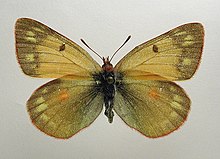You can help expand this article with text translated from the corresponding article in French. (May 2023) Click for important translation instructions.
|
| Colias hecla | |
|---|---|

| |
| Female | |

| |
| Male | |
| Scientific classification | |
| Domain: | Eukaryota |
| Kingdom: | Animalia |
| Phylum: | Arthropoda |
| Class: | Insecta |
| Order: | Lepidoptera |
| Family: | Pieridae |
| Genus: | Colias |
| Species: | C. hecla |
| Binomial name | |
| Colias hecla Lefèbvre, 1836 | |
| Synonyms | |
| |
Colias hecla, the northern clouded yellow or hecla sulphur, is a butterfly in the family Pieridae. In Europe, it is found in the northern part of Norway, Sweden and Finland up to heights of 900 m. It is also found in Greenland, Alaska, the Northwest Territories, Yukon, Quebec, Labrador, Manitoba, the Chukot region, eastern Chukotka, and the Russian Far East.
The wingspan is 36–46 mm. In the female, the black band along the edges of the wings is cut through with numerous yellow "windows", and not solid, as in the male. The species was described from Greenland, where, besides it, other Colias are not found.
The butterfly flies in June to August depending on the location. It is found in moist tundras.
The larvae feed on Astragalus species, including Astragalus frigidus and Astragalus alpinus as well as Trifolium repens. They are also known to feed on Salix arctica where Astragalus are absent.
Subspecies

- C. h. hecla (Greenland)
- C. h. glacialis (Alaska and the Northwest Territories, Yukon, Quebec, Labrador)
- C. h. hela (Manitoba, Northwest Territories)
- C. h. aquilonaris or C. h. orientis (Chukot region, Far East)
- C. h. sulitelma (Scandinavia, northwestern Siberia)
- C. h. zamolodchikovi (East Chukotka)
- C. h. viluiensis Ménétries, 1859 (Transbaikal)
C. h. sulitelma is sometimes treated as a separate species Colias sulitelma. If that is the case, C. h. zamolodchikovi is considered a subspecies of Colias sulitelma, named Colias sulitelma zamolodchikovi.
Furthermore, Colias canadensis is sometimes treated as a subspecies of Colias hecla, named C. h. canadensis.
References
- "NatureServe Explorer 2.0". explorer.natureserve.org. Retrieved 2022-03-20.
- MSc thesis, University of Helsinki, 2012. http://hdl.handle.net/10138/36981
External links
- Colias hecla von J. Fuchs
- Colias hecla, Lepidoptera of Norway
- Colias hecla, Russian Insects
- State Darwin Museum Darwin Museum type specimen images of subspecies zamolodchikovi.
| Taxon identifiers | |
|---|---|
| Colias hecla |
|
This Pieridae-related article is a stub. You can help Misplaced Pages by expanding it. |